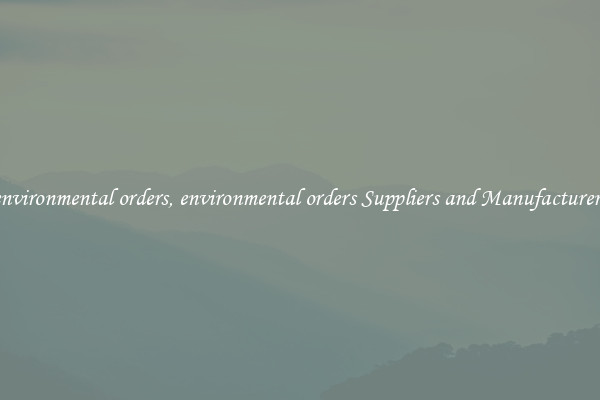environmental orders, environmental orders Suppliers and Manufacturers
Environmental orders refer to regulations, policies, and guidelines implemented by government bodies to protect the environment. These orders play a crucial role in promoting sustainable development and ensuring the preservation of natural resources for future generations. Environmental orders are designed to enforce responsible practices, reduce pollution levels, and encourage the use of eco-friendly technologies.

Suppliers and manufacturers play a significant role in complying with and implementing environmental orders. They are responsible for adopting practices that minimize their impact on the environment while producing goods and services. From minimizing carbon emissions to reducing waste generation, these companies must align their operations with the principles of sustainability and environmental stewardship.
Suppliers and manufacturers have a responsibility to source raw materials from sustainable sources. This means opting for suppliers who prioritize environmentally friendly practices, such as sustainable logging or responsible mining. By doing so, companies contribute to the preservation of biodiversity and the protection of vulnerable ecosystems.
Manufacturers should also focus on incorporating eco-friendly technologies in their production processes. Renewable energy sources, such as solar or wind power, can be used to power factories, reducing reliance on fossil fuels and minimizing greenhouse gas emissions. Additionally, companies can prioritize energy-efficient machinery and equipment, which not only reduces environmental impact but also leads to cost savings in the long run.
Waste management is another critical aspect to consider. Manufacturers should implement recycling programs within their facilities to ensure efficient use of resources and reduce waste sent to landfills. Furthermore, it is important to explore ways to repurpose or reuse by-products or waste materials generated during manufacturing processes. This can contribute to a circular economy model, where waste is minimized, and materials are used in a continuous loop.
By complying with environmental orders, suppliers and manufacturers also gain a competitive advantage. Increasingly, consumers are becoming conscious of the environmental impact of the products they purchase. Therefore, companies that can demonstrate their commitment to sustainability are more likely to attract environmentally conscious consumers.
Moreover, governments and regulatory bodies often provide incentives and grants to companies that comply with environmental orders. This can include tax breaks, grants for implementing eco-friendly technologies, or being recognized as an environmentally responsible company. These incentives not only encourage compliance but also assist suppliers and manufacturers in implementing sustainable practices.
In conclusion, environmental orders serve as essential guidelines for suppliers and manufacturers, ensuring that their operations align with sustainability principles. By sourcing raw materials sustainably, incorporating eco-friendly technologies, and implementing proper waste management practices, companies can minimize their environmental impact and contribute to a greener future. Compliance with environmental orders not only benefits the environment but also enhances a company's reputation and can lead to financial incentives. Therefore, it is crucial for suppliers and manufacturers to prioritize sustainability in their business practices.

View details

View details

View details

View details








